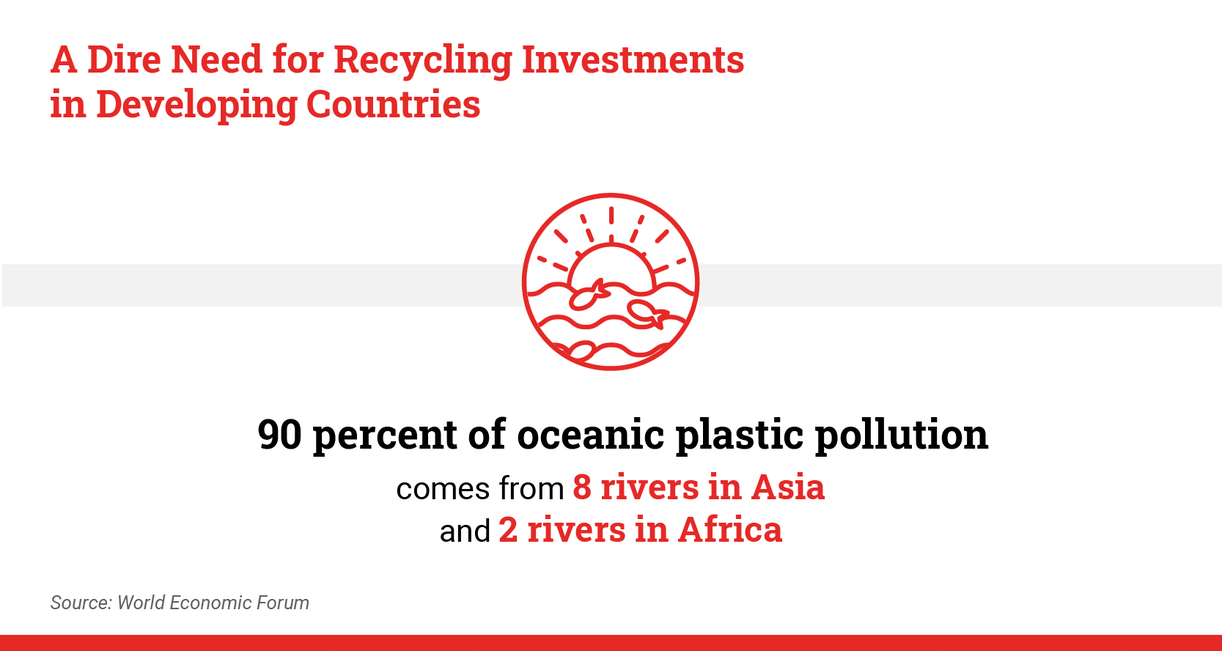The Development Finance Corporation has announced a $2.5 billion Ocean Plastics Initiative aimed at infrastructure to reduce plastic waste and debris in oceans and waterways. Investments that make waste management and recycling more efficient in developing countries are central to this new initiative and will ultimately help keep waste out of the marine environment.
Although there have been major breakthroughs in advanced recycling technologies and partnerships, more work remains. Addressing plastic pollution in developing countries is particularly important to end marine plastic pollution in areas that lack the infrastructure to properly recycle. Currently, 90 percent of oceanic plastic pollution comes from just ten rivers—eight of which are in Asia and two are in Africa. Solutions to plastic pollution must be regionally targeted to ensure that developing nations have the resources and finances to responsibly manage discarded plastics.

Local entrepreneurs and businesspeople see the opportunity to manage plastic waste, but without the necessary investment they cannot scale their operations. That’s where the Ocean Plastics Initiative can make the largest difference—attracting capital to areas where these projects would not be financed without outside funds.
The DFC’s initiative will provide funding and spur investments in small businesses in developing countries to increase the current 9-percent plastics recycling rate. Though many speculate on the sources of marine debris, separately, the historic lack of capital for waste management and recycling infrastructure has often inhibited innovative progress in this area, for both developing and developed countries. Studies have also shown that the benefits of recycling outweigh the costs of systems development, especially in terms of environmental conservation.

DFC’s timely announcement of private investment in waste management solutions is a leading example of ways to close the funding gap, helping to make recycling economically viable and keep plastic out of the environment.
The Ocean Plastics Initiative will build on previous work to reduce ocean waste; DFC this year worked with Circulate Capital, an impact investor that provides financing to small businesses working to prevent ocean plastic pollution. Already, Circulate Capital has raised $100 million in private investment to reduce plastic waste in Southeast Asia’s oceans and build new value chains that convert waste into new products. Tridi Oasis, a business in Indonesia that recycles plastic bottles into packaging materials and textiles, was the first recipient of the program’s investment.
Tridi Oasis founder and CEO Dian Kurniawati sees the funding not only as an opportunity to grow current operations but to innovate and recycle other kinds of plastics, saying:
“We will keep on innovating to recycle more types of plastic, other than plastic bottles. We are looking at the opportunity to process low-value plastic such as multi-layered plastic or flexible plastic packaging like sachets, since those types highly likely end up in the landfills or environment.”
DFC’s new initiative will encourage private sector funding in developing economies, deploying much-needed equity and debt financing, political risk insurance, feasibility studies, and technical assistance. With these new resources and recycling programs, success in Southeast Asia can be replicated all over the globe, and countries will be able to take action to create visible, long-term change that keeps plastic waste out of waterways.
Protecting water resources and preventing debris from reaching oceans are top goals for the plastics industry, which is why it invests millions of dollars each year in developing, supporting, and promoting plastics recycling programs and other conservation solutions.
The plastics industry is already working to be part of the solution.
For proof, look no further than The Alliance to End Plastic Waste, comprised of nearly 50 major global companies that have committed more than $1 billion with the goal of investing $1.5 billion over the next five years in developing countries and deploying scaled solutions that will manage and minimize plastic waste and keep our economy circular.
The Ocean Plastics Initiative will not only promote the development of waste and recycling systems in emerging markets but also allow more companies to be part of this solution. Such sustainable and efficient programs will support job creation and sector diversification and create new opportunities for a transition to a cleaner, circular economy that reduces waste and generates even more opportunities for innovation and creativity.
